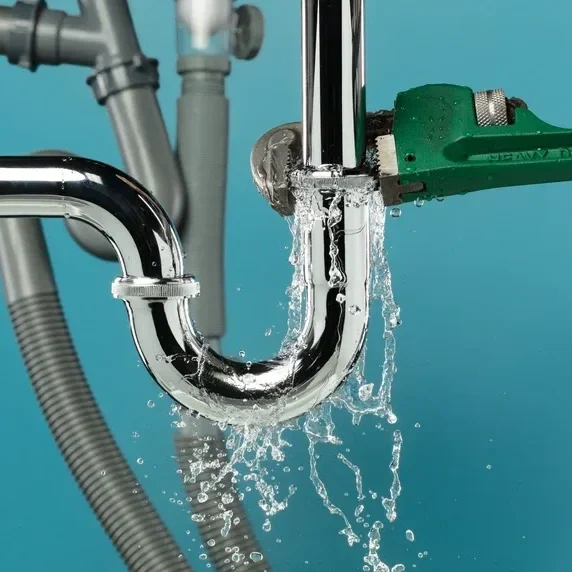Common Plumbing Leaks
Understanding where they come from, how to spot them early, and why professional repair services matter can save you thousands in future damage.
Plumbing leaks are one of the most frequent yet underestimated household problems. What starts as a small drip can quickly become a costly disaster, damaging walls, floors, and even the foundation of your home. In Las Vegas, where hard water and shifting soil are common, plumbing leak detection and professional repairs are essential to prevent severe water damage and protect your home’s long-term value.
Leaks can appear anywhere—from a worn-out faucet to a hidden water line beneath a slab foundation. Understanding where they come from, how to spot them early, and why professional repair services matter can save you thousands in future damage.
Understanding How Plumbing Leaks Start
Every plumbing system has weak points that develop over time. Factors like high water pressure, corrosion, poor installation, or extreme temperature changes can cause pipes and fittings to fail. In Las Vegas homes, mineral-heavy water accelerates corrosion, which leads to pinhole leaks in copper pipes. The combination of desert heat, shifting ground, and hard water makes regular plumbing inspections even more important.
Professional plumbers use advanced leak detection technology to identify the exact source of moisture before it spreads. Unlike visual inspection alone, these diagnostic tools help pinpoint plumbing leaks hidden inside walls, ceilings, and under flooring—without unnecessary demolition.
How To Detect Leaks In Your Plumbing System
Detecting leaks early is key to minimizing water damage. Common signs of plumbing leaks include:
Higher water bills without explanation
Low water pressure or inconsistent flow from multiple fixtures
Mold or mildew growth on walls, baseboards, or ceilings
Damp or warm spots on floors
Sound of running water when fixtures are turned off
Peeling paint or bubbling drywall from hidden moisture
Professional plumbing leak detection involves methods far beyond what a homeowner can see or hear. Technicians use acoustic listening equipment to detect escaping water beneath concrete or behind walls, infrared thermal imaging to reveal temperature variations from leaks, and pressure testing to measure system loss. These approaches make it possible to isolate even the smallest leaks with precision.
Common Sources Of Plumbing Leaks
Plumbing leaks can develop in several areas throughout your home, each requiring a unique approach for repair.
Pipe Leaks
Corrosion, water pressure, and vibration all contribute to pipe wear. Over time, these conditions weaken joints and fittings, leading to leaks in the walls or under floors. Older homes in Las Vegas built with copper or galvanized pipes are especially vulnerable.
Faucets And Fixtures
Leaky faucets are among the most common household issues. Worn-out washers, seals, or valve seats often cause continuous dripping that wastes hundreds of gallons of water per month. Replacing these components promptly prevents unnecessary waste and water damage.
Toilets
A toilet with a worn flapper valve can silently waste thousands of gallons annually. If you notice the sound of running water long after flushing, it’s time to have a professional check for internal leaks or malfunctioning components.
Appliances
Dishwashers, washing machines, and refrigerators use flexible supply lines that eventually crack or loosen. Professionals recommend replacing older plastic tubing with braided stainless-steel hoses to prevent appliance-related leaks.
Water Heaters
Las Vegas homes often have water heaters located in garages or closets, where even small leaks can go unnoticed. Corrosion around fittings or pooling water near the base of the heater signal it’s time for inspection. Early detection avoids flooding and expensive property damage.
Hidden Leaks Beneath The Foundation
One of the most serious types of plumbing leaks occurs under the concrete foundation—known as a slab leak. These leaks form when water lines buried beneath the slab crack or rupture due to corrosion, soil movement, or high water pressure. Because they develop out of sight, slab leaks often go undetected until major damage occurs.
Typical signs include warm flooring, damp carpeting, the sound of water running underfoot, or unexplained spikes in your utility bill.
Professional plumbers trained in slab leak detection use advanced tools such as tracer gas, ground microphones, and moisture sensors to locate the source accurately. Once identified, several repair methods are available:
Spot Repair: The plumber accesses the damaged section directly to replace it.
Pipe Rerouting: The leaking line is abandoned and replaced with new piping above ground.
Trenchless Pipe Lining: Epoxy coating is applied inside the existing pipe to seal cracks and restore function.
For homeowners in the Las Vegas area, where slab leaks are common, professional detection and repair prevent foundation shifting, mold growth, and long-term structural damage.
Water Damage Risks From Undetected Leaks
Even minor plumbing leaks can cause massive destruction over time. Hidden moisture leads to warped flooring, damaged drywall, and weakened framing. If water seeps into your foundation, it can create cracks that compromise structural stability. In addition to physical damage, stagnant water encourages mold and mildew growth, creating potential health issues.
Professionals trained in plumbing leak detection not only find and fix the source of the problem but also identify areas at risk for future leaks. By addressing vulnerabilities proactively, you can avoid repeat repairs and water waste.
Preventing Future Plumbing Leaks
Preventing leaks requires both routine maintenance and early detection. Homeowners can reduce their risk by following professional recommendations:
Schedule annual plumbing inspections with a licensed technician.
Maintain proper water pressure between 55 and 75 psi.
Replace aging pipes and fixtures before they fail.
Install leak detection sensors near water heaters, dishwashers, and washing machines.
Keep drains clear and avoid flushing non-degradable items.
Check for moisture around toilets, faucets, and appliance connections regularly.
Preventive plumbing maintenance not only protects your home but also reduces water consumption—a key concern in the Las Vegas Valley.
Why Professional Leak Detection Matters
Many homeowners try to locate and fix leaks themselves, but professional services offer greater precision and peace of mind. Modern plumbing companies use non-invasive leak detection equipment that finds leaks without tearing into walls or floors. More importantly, professionals understand building codes, water pressure systems, and proper repair techniques that ensure lasting results.
In areas like Las Vegas, where mineral-heavy water increases pipe corrosion, working with a professional is not just convenient—it’s essential. Certified plumbers can diagnose the cause, recommend the best repair option, and help you prevent recurring issues.
Local Plumbing Leak Repair Services In Las Vegas
If you suspect a leak in your home, professional plumbing leak repair in Las Vegas offers fast, effective, and minimally invasive solutions. Local plumbers are familiar with the region’s unique water conditions, soil composition, and building styles, allowing them to identify problems quickly.
From residential homes to commercial properties, local specialists handle everything from small faucet leaks to complete water line repairs. Choosing a licensed and insured Las Vegas plumber ensures that all work complies with city and state plumbing codes, protecting your investment and maintaining property value.
When To Call A Plumber
The best time to call a plumber is the moment you suspect a leak. Ignoring early signs can turn a minor drip into a major flood. Call a professional if you notice:
Unexplained wet spots on floors or walls
Mold growth or musty odors
Decreased water pressure
Rising water bills
Sound of water running when all fixtures are off
Prompt action allows for early intervention, preventing extensive property damage and saving on repair costs.
Protecting Your Home From Plumbing Leaks
Every home, new or old, is vulnerable to leaks. But with the right preventive care, professional inspections, and leak detection technology, you can avoid major water damage. Staying proactive keeps your home safe, efficient, and comfortable all year long.
When in doubt, call your trusted local plumber. Professional leak detection services not only fix existing problems but also safeguard your home against future water-related issues.
Urgent Plumbing Leak Questions Every Las Vegas Homeowner Should Know
How do professionals detect hidden plumbing leaks?
Plumbers use acoustic listening devices, pressure tests, and thermal imaging cameras to pinpoint leaks without damaging walls or floors.
What causes plumbing leaks in Las Vegas homes?
Hard water, shifting soil, corrosion, and high water pressure are leading causes of leaks in local plumbing systems.
Are slab leaks common in the Las Vegas area?
Yes. Many homes are built on concrete slabs, making slab leaks a frequent issue due to ground movement and mineral-heavy water.
Can I repair a leak myself?
Minor drips from faucets may be manageable, but hidden or foundation leaks require professional tools and experience to prevent further damage.
How often should plumbing be inspected?
Experts recommend an annual inspection or immediately after signs of low pressure, high bills, or visible moisture appear.
What are the benefits of hiring a local plumber?
Local Las Vegas plumbers understand area-specific challenges like hard water scaling, soil movement, and climate factors that affect plumbing systems.
How can I prevent leaks in the future?
Install a water pressure regulator, replace old pipes, and schedule professional maintenance to ensure your system stays leak-free.

